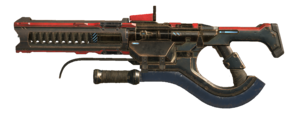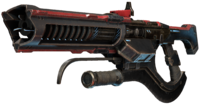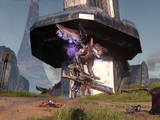Sicatt Workshop shock rifle
From Halopedia, the Halo wiki
| Shock rifle | |
|---|---|

| |
| Production overview | |
|
Manufacturer: |
|
|
Type: |
|
| Specifications | |
|
Ammunition type: |
|
|
Feed system: |
20-unit battery pack (4 shots)[3] |
|
Effective range: |
At least roughly 300m[2] |
| Service history | |
|
In service: |
|
The Sicatt Workshop Volt Piercer, commonly called the shock rifle, is a Banished directed-energy rifle.[1][2][3] It is notable for its five-round electrolaser burst capable of disabling energy shielding and even some vehicles.[2][4]
Overview
Design details
Designed for the large frames of Jiralhanae warriors, the shock rifle has massive proportions, most easily seen by its prominent rear grip. Beneath this grip is a sizeable curved blade, similar to that seen on the Type-25 Brute Shot. On the forward edge of this blade is a leather-wrapped handle used for holding the rifle steady while firing. Above this is the barrel, covered partially by a shroud that splits into three sections with each burst from the weapon. Just behind the barrel sits a sight that provides some magnification for the user. Behind this rests the top-mounted battery pack.[4]
Function
The shock rifle is a directed-energy weapon employed by the Banished. The weapon fires a five-round-burst of electrolasers,[4] with an effective range of at least roughly three hundred meters. The electrolasers are capable of emitting an electromagnetic pulse, and as few as three hits are capable of downing the shields on an F-41 Broadsword fighter.[2] When used against MJOLNIR GEN3 armor, shock rifles are capable of knocking out the integrated systems inside the helmet, including playing havoc with the integrated night vision device, heads-up display, energy shielding, smart link, and magnetic weapon mounts.[5] If the shock rifle is fired on a target with others tightly gathered around it, electricity can arc between the targets, dealing damage to each of them.[3] Some vehicles like the M12B Warthog and Banished Ghost can become temporarily disabled if repeatedly fired upon by the rifle.[4]
The shock rifle's top-loaded battery pack contains a charge of twenty units, five of which are rapidly spent in each burst from the weapon.[3] When fired, the shock rifle emits a characteristic sizzle sound.[5][4]
Operational history
Designed by the Banished's Sicatt Workshop, the shock rifle is a product of a long line of experimental voltaic application devices, a technology that is one of the few remaining vestiges of the advancements that the Jiralhanae achieved before devastating their homeworld and society during the First Immolation.[1]
Shock rifles were widely employed by the Jiralhanae troops of the Gray Guards during Operation: WOLFE,[2] and by Escharum's forces as they fought for control of Installation 07 in 2560.[6] The weapons are charged and maintained at local Banished armory outposts.[1]
Gameplay
Halo Infinite
The shock rifle is a medium-to-long-range weapon with a "magazine" size of twenty units. Five of these units are spent with each trigger pull, thus requiring the rifle to be reloaded after every four shots. It takes two body shots to kill a fully-shielded Spartan in multiplayer. However, a single burst from the shock rifle can kill a fully-shielded Spartan if all five electrolasers in the burst are headshots.[4] If fired at a living enemy with other enemies closely gathered around, the electric damage can arc between them. Its shots can also arc off of vehicles and other gameplay objects, such as weapons, and the flagpoles in Capture the Flag.[3] In the event that drivable vehicles such as Ghosts or Warthogs are hit by two or more shots from a shock rifle, they will become temporarily disabled.[4]
 This section needs expansion. You can help Halopedia by expanding it.
This section needs expansion. You can help Halopedia by expanding it.
Gallery

|
Browse more images in this article's gallery page. |
The first in-game look at the shock rifle in Halo Infinite.[6]
A Skimmer wielding a shock rifle.
List of appearances
- Halo: Shadows of Reach (First appearance)
- Halo Infinite
Sources
- ^ a b c d Halo Waypoint, Canon Fodder - Preview Purview (Retrieved on Sep 29, 2021) [archive]
- ^ a b c d e f Halo: Shadows of Reach, chapter 19
- ^ a b c d e YouTube - HALO, Halo Infinite | Multiplayer Tech Preview Early Look (Retrieved on Sep 23, 2021)
- ^ a b c d e f g Halo Infinite Multiplayer Tech Preview (September 2021)
- ^ a b Halo: Shadows of Reach, chapter 21
- ^ a b YouTube - Halo, Halo Infinite | Development Update - August (Retrieved on Aug 20, 2021)
| |||||||||||
![The first in-game look at the shock rifle in Halo Infinite.[6]](https://halo.wiki.gallery/images/thumb/d/da/HINF_ShockRifleTease.png/200px-HINF_ShockRifleTease.png)

